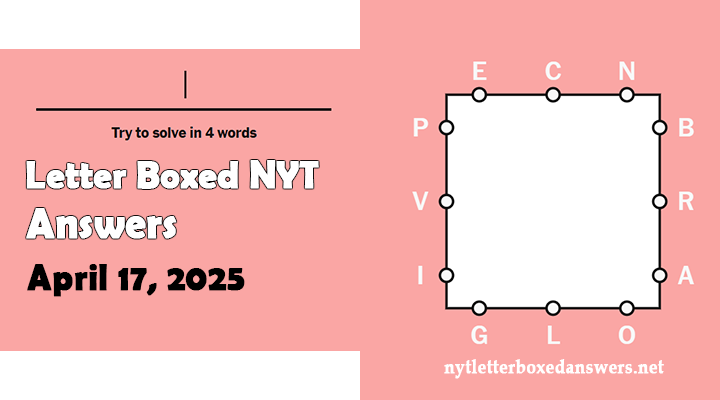NYT Letter Boxed quiz for Thursday April 17, 2025 is released. We came up with Letter Boxed April 17 2025 Answers and Hints for you. With the help of these hints, you will be able to guess the words of letter boxed quiz without revealing the answers and get the solution.
| Top | Right | Bottom | Left |
|---|---|---|---|
| ECN | BRA | GLO | PVI |
| Two Words Solution | ||
|---|---|---|
| BICORPOREAL | LEVELING | |
| CAVALIER | REPROBING | |
| PROBE | EVANGELIC | |
| Three Words Solution | ||
|---|---|---|
| ACING | GIBER | REPROVAL |

Word 01:
This 11-letter word starts with B and ends with L.
Refers to having two physical forms or bodies.
Often used in philosophical or metaphysical discussions.
Related to dualism in mind-body theories.
Starts with the prefix “bi-“, meaning “two”.
Ends with a suffix often seen in adjectives.
Rarely used in everyday conversation.
Shares roots with “corporeal” meaning “bodily”.
Can describe beings in fantasy or spiritual fiction.
Appears in complex academic or theological texts.
Word 02:
This 8-letter word starts with L and ends with G.
Refers to the act of making something flat or even.
Common in construction and landscaping contexts.
Can mean reducing differences or inequalities.
Related to the word “level.”
May describe destruction, like leveling a city.
Found in video games when increasing character rank.
Can be used metaphorically, e.g., “leveling the playing field.”
Frequently appears in engineering and architecture.
Verb form often used in progressive tense.
Word 01:
This 8-letter word starts with C and ends with R.
Originally referred to a mounted soldier or knight.
Can describe someone with an arrogant or dismissive attitude.
Also used as an adjective for someone carefree or nonchalant.
Associated with English Royalists during the Civil War.
Shares roots with the word “cavalry.”
Often used in historical or chivalric contexts.
Appears in literature to describe noble yet reckless characters.
Related to Latin caballarius, meaning horseman.
May refer to a spaniel dog breed as well.
Word 02:
This 9-letter word starts with R and ends with G.
Means to investigate or examine again.
Prefix implies repetition.
Common in scientific or forensic processes.
Could be used in data analysis or diagnostics.
Derived from the verb “probe.”
Suggests double-checking or verifying something.
Can appear in lab work or medical testing.
Used in contexts requiring confirmation of results.
Rare but useful in technical writing.
Word 01:
This 5-letter word starts with P and ends with E.
A tool or method used for investigation.
Common in science fiction (e.g., alien probe).
Used in medicine, often for internal inspection.
Can be both noun and verb.
Appears in phrases like “space probe.”
May refer to investigative journalism.
Often related to exploration or discovery.
Can be used figuratively for deep questioning.
Starts with “pro-,” meaning forward or in favor.
Word 02:
This 9-letter word starts with E and ends with C.
Relates to spreading religious beliefs or the gospel.
Rooted in Christianity.
Shares origin with “evangelist.”
Often used to describe certain fervent preaching styles.
Can be associated with televangelism.
Describes a strong advocacy approach.
Appears in religious and historical contexts.
Used in both secular and sacred references.
Not to be confused with “angelic.”
Word 01:
This 5-letter word starts with A and ends with G.
Means performing perfectly, like “acing a test.”
Derived from the noun “ace.”
Often used in sports like tennis.
Slang for doing extremely well.
Can be present participle or gerund form.
Common in American English expressions.
Positive connotation, implying mastery.
Used in casual and academic contexts.
Starts with the same letter as “achievement.”
Word 02:
This 5-letter word starts with G and ends with R.
Means someone who talks nonsense or foolishly.
Comes from the verb “gibe.”
Can imply mocking or sneering speech.
Rarely used in modern speech.
Found in older English literature.
Sometimes confused with “jabber.”
Ends with the same letters as “jabberer.”
Negative tone or connotation.
Synonym of “taunter” or “mocker.”
Word 03:
This 8-letter word starts with R and ends with L.
Means an expression of disapproval or criticism.
Formal or serious in tone.
Derived from the verb “reprove.”
Appears in moral or disciplinary contexts.
Often used in literary writing.
Similar to reprimand or rebuke.
Not as harsh as “condemnation.”
Might be used by mentors or leaders.
Ends with “-al,” like many abstract nouns.

Chris Brown is a passionate word game love and problem solving expert. With over 15 years of experience in solving puzzle challenges, he provides daily NYT Letter Boxed answers, tips and strategies to help other players so that they can improve their solving skills. Whether you are stuck on a tricky puzzle or looking for new techniques, Chris is here to guide you with his expert solutions.